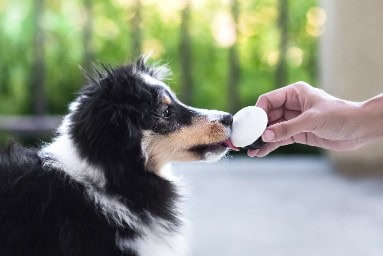Not So Sweet: Xylitol Poisoning in Pets

When you think of pet toxins, items like antifreeze and chocolate probably come to mind. Those things are definitely high on the list of “no-no’s” when it comes to your pet, but one of the most dangerous pet toxins can be found in your pantry, fridge, or medicine cabinet without you even realizing it.
Xylitol, a popular sugar substitute, is found in everything from cough drops to peanut butter to toothpaste, and it doesn’t take much to severely affect or even kill a pet. Keep reading to find out more about xylitol poisoning and what you can do to prevent it.
Xylitol 101
Xylitol is an alternative sweetener commonly used as a sugar substitute. This sugar-alcohol is naturally occurring in a variety of fruits, vegetables, and mushrooms, but is commonly extracted from corn fiber, birch trees, or hardwood trees. This wildly popular ingredient has a low glycemic index, making it ideal for diabetics or those following a low-sugar diet.
Unlike with humans, pets are unable to effectively process xylitol. The substance is absorbed rapidly (as quickly as 30 minutes) and triggers the pancreas to release a large amount of insulin all at once. The results of this insulin rush are a life-threatening drop in blood sugar and the potential for kidney failure.
Products that may contain xylitol include:
- Gum
- Sugar-free candy and mints
- Sugar-free baked goods
- Cough drops
- Toothpaste
- Mouthwash
- Certain types of peanut butter
- Sugar-free chewable vitamins
- Nasal sprays
- Certain medications
Xylitol Poisoning
If you know or suspect your pet has ingested something sweetened with xylitol, please contact us immediately. Symptoms of xylitol poisoning include:
- Vomiting
- Weakness
- Tremors
- Seizure
- Coma
The Best Medicine
As always, preventing your pet from getting into trouble in the first place is always the best course of action. To avoid a dangerous situation, keep all food items and personal care products out of your pet’s reach. Read all labels, and avoid buying products with xylitol whenever possible.
Please don’t hesitate to contact the staff at Rocklin Ranch Veterinary Hospital for more information. We’re always here for you and your pet!

